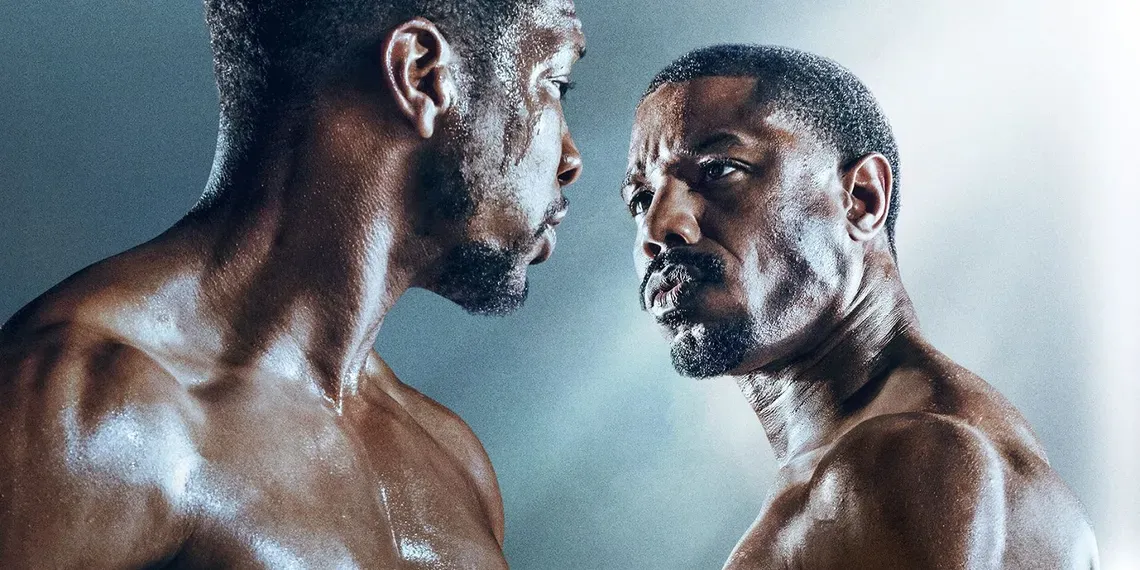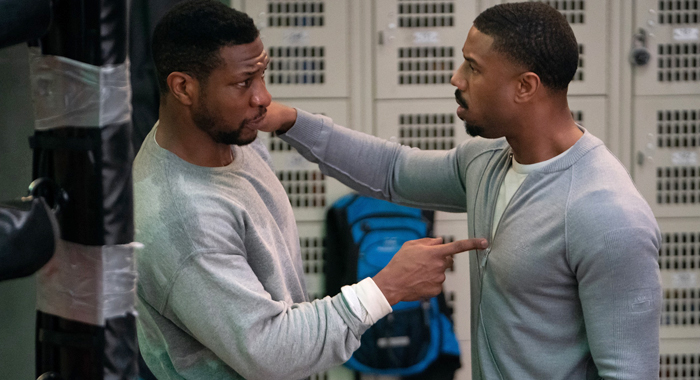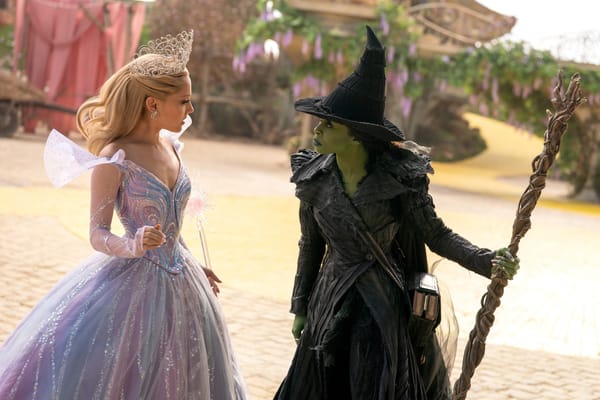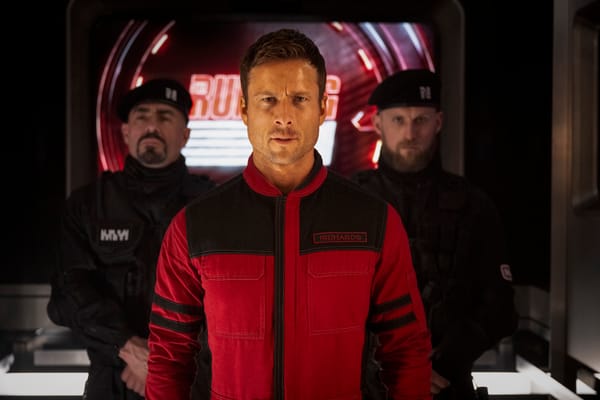'Creed III' Forges a New Legacy for the Franchise
Plus: Some thoughts on Chris Rock's new Netflix comedy special.

In today’s newsletter, I’m pleased to bring you Chrishaun Baker’s thoughts on Creed III (note: contains some basic plot details from Creed III and spoilers for the first two Creed movies). Then, I talk about Chris Rock’s new Netflix special. Be sure to stay to the end for a fun road trip vlog.
From the moment that young Adonis Creed (Michael B. Jordan) put on his father’s signature stars-and-stripes back in 2015’s Creed, audiences have wondered how the new franchise would carve out its own legacy. After Ryan Coogler humanized and mythicized Rocky Balboa with that sleeper hit, the sequel provided him with a surprisingly poignant send-off, paving the way for Sylvester Stallone to finally step away from the role on the graceful high note that he’s always wanted. To many, a question of identity hangs in the air for the series, but truthfully, the prior two films have already established an identity of their own – one that uses the conventions of the boxing genre to explore Black masculinity and emotional maturity in cinematic ways. Even though we see it briefly, most of Donnie’s childhood is a gaping wound, still raw and patched over with the flimsy coping mechanisms necessary to survive the racialized pipeline that once shunted him and many boys just like him towards prison or worse. As triumphant as each of his fights have felt, they all pale in comparison to watching Adonis fight to unlearn the expectations put on him by a world that set him up to fail.
Taking that rags-to-riches angle and running with it, Creed III is another resounding success for the series, a genre-savvy trilogy capper that sees Michael B. Jordan in the directorial chair for the first time. With a career as varied as his, Jordan has picked up quite a few tricks as a filmmaker, but it’s obvious that his start on The Wire and frequent collaborations with Ryan Coogler have impressed upon him an appreciation for natural, intimate drama. The stakes here are devastatingly personal, and they’re executed with a reserved (but effective) stylistic hand.
Thrumming underneath the surface like a well-oiled machine is a tight screenplay by Zach Baylin and Keenan Coogler, whose brother Ryan remains involved as a producer. After beating out a dynasty for himself and retiring as an undefeated champion, Adonis now sits poised for a new chapter in his life along with his wife Bianca (Tessa Thompson) and his daughter Amara (Mila Davis-Kent) – but nothing crumbles dynasties quite as efficiently as time, which is exactly what catches up with Donnie when he finds “Diamond” Damian Anderson (Jonathan Majors) waiting for him outside of Delphi Boxing Academy. The two men haven’t seen each other since one fateful night in 2002, in which a violent altercation ended with Damian spending 18 years in prison.

Over nostalgia-tinted dinners and introductions to the family, Donnie and Dame become reacquainted, but there’s an uneasiness simmering behind Dame’s antsy smile – before landing in prison, he was a former Golden Gloves boxer with aspirations of going pro, and now that he’s outside, he’s consumed by a burning desire to step back into the ring. Recognizing his own past frustrations in his friend, Donnie obliges, but the ever-observant “Little Duke” Evers (Wood Harris) recognizes something else as well: bloodlust. It’s not long before Damian is in the ring breaking through boxers in an attempt to force the world into submission, growing more agitated and dangerous with each match.
Jordan’s archetypal framing of the friends-turned-rivals conflict speaks to his lifelong adoration of shonen and seinen manga such as Naruto and Akira, but Jonathan Majors’ complex and sinister performance harkens back to Tupac Shakur’s underappreciated turn as Bishop in Juice. A wall of rigid muscle and blistering resentment, Damian recognizes the devastating power of violence within the ring, and he lusts after it. All he knows are necessity and survival, while Adonis sits in comfort reaping the fruits of his labor and the benefits of his name. It’s a twisted Madhouse reflection of the underdog dynamic in the original Rocky, and the conflict between Damian and Donnie is accentuated with searing intensity by Kramer Morgenthau’s sharp, claustrophobic camerawork.
Eventually, that conflict spills over into Adonis’ domestic life – the stresses of his shared past with Damian begin to tear at his relationship with his adopted mother Mary Anne (Phylicia Rashad). To make matters worse, Amara gets in trouble for fighting a bully at school, forcing Donnie and Bianca into a frank conversation about the importance of healthy communication. Perhaps the most promising sign of Jordan’s skill as a director is how well he balances the ensemble and familial drama here. Phylicia Rashad and Tessa Thompson both get nuanced material to sink their teeth into, while young Davis-Kent gives a sincere performance that centers Amara’s deafness in a refreshingly inclusive way.
The first Creed gave us some of the most visceral boxing scenes ever, and while the choreography of the second film wasn’t awful, it lacked the same level of immersion. Creed III rectifies that issue, with a commitment to the kind of intimate, focused editing that Coogler used to such spectacular effect. Morgenthau and Jordan put us in the middle of the ring as well as Adonis’ very perspective, sometimes even slowing down time to show us the fight from the most vulnerable angles. The result is nothing short of exhilarating.
But for all the jaw-breaking, bone-crunching spectacle, the best part of Creed III’s action sequences is how Jordan uses stylistic visuals to evoke raw characterization. When the time finally comes for Damian and Adonis to step into the ring as bitter enemies, the film once again conjures up the casual aesthetic bombast of anime, showing us firsthand exactly what the two fighters think of each other. Under Jordan’s direction, the ring itself becomes a reflection of the bleak systemic conditions that brought both fighters to that exact moment, suddenly rendering their battle in much more operatic, Shakespearean terms. Paradoxically, Creed III understands that as satisfying as it is to watch two chiseled men work through their trauma blow-for-blow, it can be just as cathartic to see them learn how to navigate conflict in an emotionally healthy way instead. -Chrishaun Baker
Chris Rock Slaps Back
This past Saturday, I was able to watch Chris Rock’s new comedy special Selective Outrage live as it aired. It was Netflix’s first live event and the show went out to 190 countries — no small technological feat. Everything seemed to go smoothly during the special itself (there were a handful of technical stumbles, but I didn’t experience any buffering issues or the like). But the show also featured a pre-show and a post-show with different hosts/segments that were…weird? While I appreciate Netflix trying to tap into the audience’s strong desire to react to something they’ve just seen (hell, I’m trying to build a whole podcast network out of it), the pre-show and post-show felt like add-ons that weren’t integral to the special, nor did they seem particularly well-thought-out in terms of flow or choice of hosts. It threw the entire evening off balance a bit. I assume they’ll continue to iterate and improve on this component in future live events to come.
As for the special itself: while it was intermittently very funny, I can’t help but be a bit disappointed overall. As time has gone on, I’ve found that many of the comedians I admired growing up — Dave Chappelle, Chris Rock, etc. — have lost a lot of their edge. They’ve become wealthy and successful (Rock was paid a reported $40 million for two specials), and commenting on that wealth has become a part of their comedic identity. Rock riffed extensively on the difficulty of having a spoiled daughter in private school and about the exorbitant amounts of money he needed to spend to impress women as a divorced single man. But while somewhat amusing, this material is a lot less biting, relevant, or relatable. It’s hard to punch up when you’re already at the top.
Rock reserved his sharpest barbs for Will and Jada Pinkett-Smith. In a 10-minute rant about The Slap that closed out his set, Rock shared his perspective on last year’s fateful events and it was vicious and unforgiving. If there was any hope that Rock might use this opportunity to bury the hatchet, he removed all doubt that he’s still angry and he’s not ready to move on quite yet. And with this special coming out one week before this year’s Oscars, it also felt meticulously timed to achieve maximum PR impact. My guess is this will be a feud that will last for years to come.
I didn’t love the way Rock went after Meghan Markle and Jada Pinkett-Smith in his special, two women who’ve done nothing to Rock (and I’m not the only one). But as for the rest of his closing rant, I can’t say I can judge Rock for going after Will Smith in the way that he did. Rock was at the center of an international cultural incident, one in which he was smacked in the face on live television by someone much bigger than him in front of an audience of millions. I have no idea how I’d personally handle something like that, but if I had to guess, I probably would’ve been podcasting about it later that night! Meanwhile, Rock has kept quiet about it for a year, choosing to unleash hell on the Smiths publicly only after banking a huge payday from Netflix. I wouldn’t say this approach is virtuous but it is, at the very least, an incredibly canny business move.
Selective Outrage indeed.
Stuff David Chen Made Recently
- I did a road trip to Santa Barbara from Seattle this week and I made a mini-vlog about it over on my Instagram and Tiktok.
- Over on Decoding Reality, Justin and Daejah are continuing to recap the continuing misadventures of Zach Shallcross, or as he’s also known, “The Nickelback of Bachelor Nation.”
- On Decoding TV, Christian Spicer and I dove into his week’s episode of The Last of Us, which took us ever further into the depths of humanity.
- On The Filmcast, we reviewed Cocaine Bear. Then, on the After Dark, we had a blast chatting with comedian and actor Scott Seiss, who plays a paramedic in the film during a particularly crucial scene.



